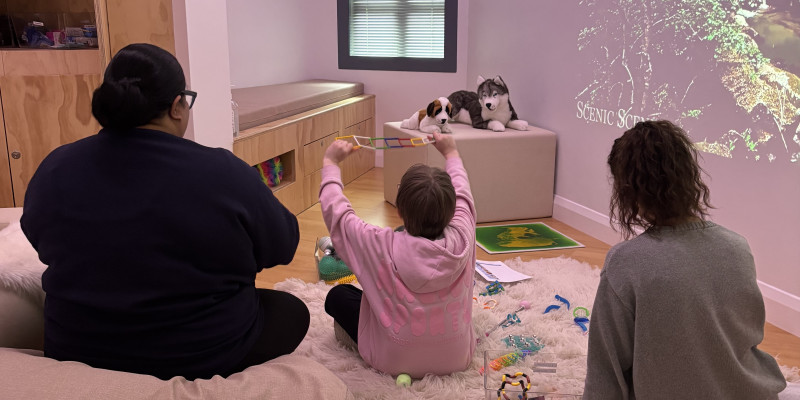
At Kenepuru Hospital’s Regional Rangatahi Adolescent Inpatient Service, a new sensory room is transforming the way our rangatahi (young people) manage stress and build resilience. Opened in March 2025 after careful planning and construction, the space is already making a big difference to rangatahi and staff alike.
Designed with coloured lights, a projector, soft furniture and a range of sensory tools, the room offers rangatahi a safe, therapeutic environment. The space can be tailored to meet each person’s individual needs, so is set up to be either calming or stimulating to suit.
“We’ve designed the environment and chosen the tools to help our rangatahi learn strategies to manage their distress and self-regulate,” says Helen Patea, Team Leader of the service. “These strategies become part of their wellness plans they carry with them on discharge. This approach helps us avoid escalation and reduces the use of restrictive practices like seclusion or restraint.”
Since its opening, the sensory room – which is in use on a daily basis – has boosted staff confidence in using sensory modulation strategies and is already showing results.
“Our nurses have observed how the environment can soothe distressed rangatahi or those who have difficulty regulating their emotions,” Helen says. “They’re closely monitoring the room and collating data from room logs to track usage, tools and impact. They also complete sensory profile assessments of rangatahi who use the room and plans are underway to introduce a self-rating scale, which will provide deeper insights into how the space supports their wellbeing.”
“Feedback has been overwhelmingly positive. Our rangatahi say they love the music, projector, sensory soft toys and fidgets, lighting and quiet environment of the room. Some have even said they want their bedrooms in the unit to be redesigned to match it.”
MHAIDS Executive Clinical Director Paul Oxnam says the sensory room, and similar ones in other services around the region, play an important part in supporting the people we serve.
“These soothing environments provide a space where people feel safe and supported, which helps reduce distress. The sensory modulation assessments our clinicians provide help service users discover what helps them feel calm and build strategies they can take with them beyond their time with us”.
Thanks to Wellington Hospitals Foundation’s generous donors who contributed funding for the sensory tools and safe furnishings in the room, helping empower patients to feel more in control of their mental health journey.